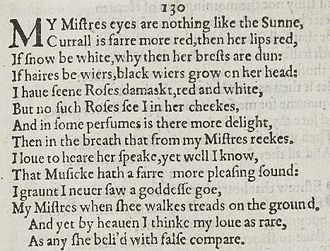Sonnet 130
Q1
Q2
Q3
C
My mistress’ eyes are nothing like the sun;
Coral is far more red than her lips’ red:
If snow be white, why then her breasts are dun;
If hairs be wires, black wires grow on her head.
I have seen roses damask’d, red and white,
But no such roses see I in her cheeks;
And in some perfumes is there more delight
Than in the breath that from my mistress reeks.
I love to hear her speak, yet well I know
That music hath a far more pleasing sound:
I grant I never saw a goddess go,
My mistress, when she walks, treads on the ground:
And yet, by heaven, I think my love as rare
As any she belied with false compare.
4
8
12
14
William Shakespeare's Sonnet 130 mocks the conventions of the showy and flowery courtly sonnets in its realistic portrayal of his mistress.
Sonnet 130 satirizes the concept of ideal beauty that was a convention of literature and art in general during the Elizabethan era. Influences originating with the poetry of ancient Greece and Rome had established a tradition of this, which continued in Europe's customs of courtly love and in courtly poetry, and the work of poets such as Petrarch. It was customary to praise the beauty of the object of one's affections with comparisons to beautiful things found in nature and heaven, such as stars in the night sky, the golden light of the rising sun, or red roses. The images conjured by Shakespeare were common ones that would have been well-recognized by a reader or listener of this sonnet.
Shakespeare satirizes the hyperbole of the allusions used by conventional poets, which even by the Elizabethan era, had become cliché, predictable, and uninspiring. This sonnet compares the poet's mistress to a number of natural beauties; each time making a point of his mistress' obvious inadequacy in such comparisons; she cannot hope to stand up to the beauties of the natural world. The first two quatrains compare the speaker's mistress to aspects of nature, such as snow or coral; each comparison ending unflatteringly for the mistress. In the final couplet, the speaker proclaims his love for his mistress by declaring that he makes no false comparisons, the implication being that other poets do precisely that. Shakespeare's sonnet aims to do the opposite, by indicating that his mistress is the ideal object of his affections because of her genuine qualities, and that she is more worthy of his love than the paramours of other poets who are more fanciful.
...
Wikipedia

